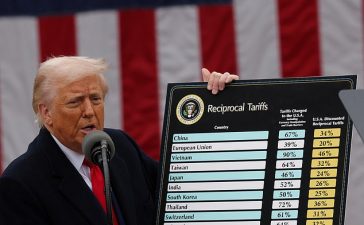The energy price cap is set to fall by the equivalent of £122 a year from July 1 bringing relief to millions.
The new figure, based on typical use is £1,568 a year, which represents a reduction of around £500 compared to this time last year.
The fall will be seized on Rishi Sunak to provide new evidence that Britain has ‘turned a corner’.
National Energy Action said the drop, which is a reduction of 7 percent, “will be a relief to many”.
However, it said some 5.6 million households remain in fuel poverty which means difficult choices between using energy and putting food on the table.
At the same time, it said annual bills remain £400 a year higher than before the energy crisis triggered by Russia’s invasion of Ukraine.
Its chief executive, Adam Scorer, said: “Every fall in the price cap is good news. It should make life a little easier for everyone.
“But for our clients, and for millions of households in fuel poverty, there remains a huge gap between current prices and affordable energy bills.
“Over 2 million households owe over £3 billion of household energy debt.
“Millions will still be in negative budgets. Even more will be cut off from basic levels of heat and power.
“Unfortunately, fuel poor households will not enjoy affordable energy through occasional small changes in the price cap.
“Whoever wins the next election inherits the responsibility to build fuel poverty out of inefficient homes and build greater protection into the regulation of the energy market.”
The energy regulator Ofgem, which sets the cap, said: “The price cap, which sets a maximum rate per unit that can be charged to customers for their energy use, will fall by 7 percent from 1 July to 30 September 2024, compared to the previous quarter.
“For an average household paying by direct debit for dual fuel this equates to £1,568, a drop of £122 over the course of a year.
“The average household paying by prepayment meter for dual fuel will pay £1,522 over the course of a year. The average household paying for dual fuel by standard credit will pay £1,668 over the course of a year.”
The price cap assumes a standing charge of £334 for a dual fuel customer (£369 for those who pay by standard credit). This is unchanged from the last price cap period.
Claire Coutinho, the Secretary of State for Energy Security and Net Zero, is today announcing a string of initiatives to keep bills down.
These include a pledge that controversial green levies on energy will be kept below their current level for the next five years.
Ms Coutinho will also promise to retain the energy price cap for at least the lifetime of the next parliament.
She said the Tories “will always prioritise your bills in decisions we make on energy”.
She said voters face a choice between a government that will take a “realistic approach” to Net Zero and a Labour Party that will “lump families with unnecessary bills they cannot afford”.
She added: “The alternative is handing Labour and Ed Miliband control of your energy bill, along with his plan to pursue dangerous and expensive energy targets that no other country is aiming for.”
Labour is committed to decarbonising the electricity system by 2030, five years earlier than currently planned.
Speaking in Scotland today, Sir Keir Starmer will say the plan, overseen by a new state-owned power firm GB Energy, will ‘cut your bills for good’ by massively increasing green energy sources.
But Ms Coutinho said the ‘only way’ to achieve that aim would be to “raise your taxes, hike your bills or saddle your children with debt”.










